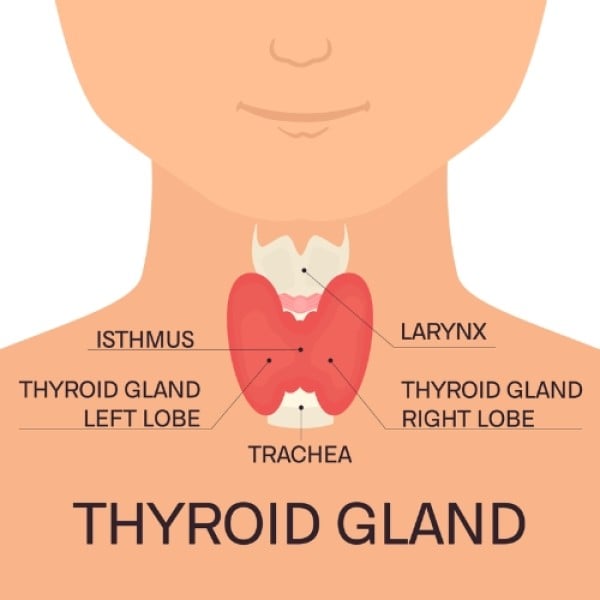If you're a frequent visitor to Healthify, why not share our site with a friend? Don't forget you can also browse Healthify without using your phone data.
Thyroid function tests
Key points about thyroid function tests
- Thyroid function tests are a group of blood tests that give information about how your thyroid gland is working.
- They could be done to test for an underactive or overactive thyroid, or to monitor your thyroid function if you're taking medicines.
- They could also be done to check for a pituitary or fertility problem and as a screening test in newborn babies.
- Interpreting thyroid function tests is complicated. Talk to your healthcare provider about what your results mean for you.

Thyroid function tests are a group of blood tests done to test how well your thyroid gland is working.
Your thyroid is a small gland at the front of your neck. It makes hormones that help control important things in your body, such as your heart rate and body temperature. If you have too much or too little of these hormones it can make you feel very unwell.

Image credit: Depositphotos
The most common thyroid function blood tests measure the levels of 3 hormones – thyroid-stimulating hormone (TSH), triiodothyronine (T3) and thyroxine (T4).
Thyroid stimulating hormone (TSH)
TSH is made by your pituitary gland, which is located in your brain. Your pituitary senses the level of thyroid hormones called T3 and T4 (see below) in your blood, just as the thermostat in your living room senses the temperature.
TSH is released by your pituitary gland and acts as a messenger to your thyroid. When levels of T3 and T4 drop below normal, your pituitary makes more TSH to stimulate your thyroid to make more T3 and T4. On the other hand, when T3 and T4 levels are too high, less TSH is released to reduce production of T3 and T4.
This system usually works perfectly. However, if you have a thyroid or pituitary condition it becomes unbalanced and can make you feel very unwell.
Triiodothyronine (T3) and thyroxine (T4)
T3 and T4 are produced by your thyroid gland. T4 is the main hormone produced by your thyroid gland, but T3 is the more active thyroid hormone in your body. Some T3 is made by your thyroid but most is made by converting T4 to T3 in tissues like your liver and kidneys.
Usually, the ‘free’ or ‘active’ portions of T3 and T4 are measured, so these tests are known as FT3 and FT4. The term ‘free’ thyroid hormones means the hormones are in the active form and can enter your tissues when needed.
Thyroid antibodies
If your healthcare provider thinks you might have an autoimmune condition affecting your thyroid gland then they may also test for thyroid antibodies. An autoimmune condition is when your immune system mistakenly makes antibodies that attack healthy cells in your body. The 2 main autoimmune conditions affecting the thyroid gland are Hashimoto’s disease, which causes hypothyroidism, and Grave’s disease which causes hyperthyroidism.
Thyroid function tests are usually done:
- to investigate symptoms or signs of an underactive thyroid (hypothyroidism), such as fatigue, weight gain, cold intolerance, constipation, dry skin and slow heart rate
- to investigate symptoms or signs of an overactive thyroid (hyperthyroidism), including weight loss, heat intolerance, palpitations, anxiety, and tremor
- to monitor your thyroid function if you’re taking medicine for a thyroid condition
- to check your thyroid function if you’re taking medicines that can affect your thyroid, such as amiodarone and lithium
- if you have signs of problems with your pituitary gland
- if you’re a woman with fertility problems
- to check thyroid function if you’re pregnant and have known or suspected thyroid disease
- to screen (check) for thyroid problems in newborn babies with the heel prick test(external link) that’s done when your baby is born.
Generally, you won't need to do anything before having a thyroid function test. It can be done at any time of the day. Some medicines may affect the test so tell your healthcare provider about all prescription and non-prescription medicines you take. This includes herbal products, supplements and rongoā Māori.
If you're taking thyroid medicines, tell your healthcare provider when you took your last dose. They may ask that you stop taking this temporarily before having the test.
A thyroid function test is done as a blood test which means a small amount of blood is taken from a vein in your arm using a small needle.
The blood sample is collected in a tube, which is sent to the laboratory for analysis. Read more about blood tests.
Interpreting thyroid function test results is complicated. An abnormal result doesn’t necessarily mean that anything is wrong. Other health conditions, extreme stress and pregnancy, as well as some medicines, affect the levels of thyroid hormones. It’s important to talk with your healthcare provider about what your results mean for you.
An abnormal TSH usually means there’s too little or too much thyroid hormone available to your body, but it doesn’t tell why this is happening. If you have an abnormal TSH result, this will usually be followed by testing of your FT4 and/or FT3 levels to investigate the cause.
A high TSH result:
- often means an underactive thyroid gland.
- can also occur if you have an underactive thyroid gland and aren't receiving enough thyroid hormone medication
- can, in rare cases, indicate that you have a problem with your pituitary gland, such as a tumour that's producing TSH.
A low TSH result:
- can indicate an overactive thyroid gland or a problem with your pituitary gland that's preventing it from producing enough TSH
- can also occur if you have an underactive thyroid gland and you're receiving too much thyroid hormone medicine.
Blood test safety information(external link) Awanui labs, NZ, 2022
Understanding your thyroid function results(external link) Health New Zealand | Te Whatu Ora
Brochures
What you should know about your thyroid function tests(external link) Pathology Tests Explained, Australia
References
- Thyroid function tests(external link) Patient Info, UK, 2023
- Thyroid function tests(external link) Pathology Tests Explained, Australia, 2025
- Thyroid function tests(external link) Auckland HealthPathways, NZ, 2023
Management of thyroid dysfunction in adults(external link) BPAC, NZ, 2010
Thyroid function tests(external link) Patient Info Doctor, UK, 2020
Credits: Healthify editorial team. Healthify is brought to you by Health Navigator Charitable Trust.
Reviewed by: Dr Grace Lee, FRNZCGP and Clinical Educator
Last reviewed:





